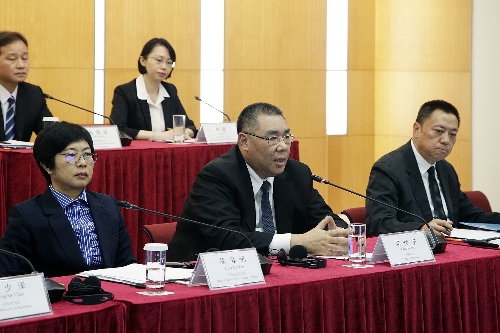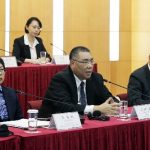 The Chief Executive, Mr Chui Sai On, outlines further measures to optimise response to public emergencies at the press conference.
The Chief Executive, Mr Chui Sai On, outlines further measures to optimise response to public emergencies at the press conference.
The Chief Executive, Mr Chui Sai On, today announced a number of measures to improve Macao’s response mechanism in case of public emergencies, including the strengthening of infrastructure to resolve flooding issues and ensuring the stability of power and water supplies.
The Commission for Reviewing and Monitoring the Improvements of the Response Mechanism to Major Disasters – headed by Mr Chui with the five Government Secretaries as members – held a press conference today at the Government Headquarters to review the relief efforts that took place after Typhoon Hato, and to announce further short-, medium-, and long-term initiatives to advance Macao’s overall response mechanism system.
On 23 August, Typhoon Hato – the strongest recorded storm in Macao for 53 years – struck the city, causing 10 human fatalities and injuring approximately 240 people. The strong typhoon also caused severe flooding and interruption of water and electrical supplies.
A rough estimation indicated the economic losses from Typhoon Hato – as measured so far – amounted to 11.47 billion patacas, including 8.31 billion patacas-worth of direct losses and 3.16 billion patacas-worth of indirect ones. The preliminary figures did not include the potential losses of firms that had to suspend business operations due to typhoon damage.
During the press conference, the Chief Executive announced the establishment of a committee to consider whether public departments and civil servants had acted appropriately during preparation for Typhoon Hato and in relation to relief work done in its aftermath. Mr Mai Man Ieng, an Assistant Prosecutor-General, has been appointed to head the investigation. Mr Chui noted the Commission Against Corruption (CCAC) had commenced last week an investigation regarding internal management of the Meteorological and Geophysical Bureau. Findings of the CCAC’s investigation would be passed to the investigation committee for reference.
The Government’s post-typhoon relief efforts included a number of subsidies for families and for local small- and medium-sized businesses affected by the storm. Mr Chui said such subsidies were aimed to alleviate immediate financial pressure faced by the community. Most importantly, the Government as always was committed to optimising response measures for major disasters and advancing the city’s infrastructure to ensure it could always cope with a crisis.
After the storm, the Government had authorised construction projects in order to increase the height of the existing anti-flood embankment system across the city. Additionally, the Government would speed up procedures regarding the building of further pumping facilities at the Inner Harbour, in order to enhance the city’s capacity for dealing with storm water.
Regarding a cross-boundary flood control system, the Chief Executive is due to visit Guangdong Province to discuss further technical details. In the meeting with officials there, the two sides would also discuss suggestions from the State Council and competent ministries and departments of the Central Government regarding a Government proposal for the cross-boundary flood system.
In order to maintain a stable water supply during disasters, the Government planned to build a greater number of storage tanks in upland areas across the city, to increase water reserves to the equivalent of 12 hours-worth of public consumption.
Regarding power supply, once construction of some electrical generator sets had been completed, the city would be able to supply 30 percent of its power locally. In case of emergencies, the Government would make use of existing petrol-fuelled generators, so that more than 50 percent of power could be produced locally.
The Government also planned to provide an emergency accommodation centre for public use, by redeveloping existing large sports facilities located in an upland area.
As of 3 September, the Government had received approximately 980 opinions and suggestions regarding the topic of an appropriate response mechanism system in the event of a crisis. Members of the public are welcome to contribute further opinions or suggestions on or before 11 September via the Policy Research Office.


